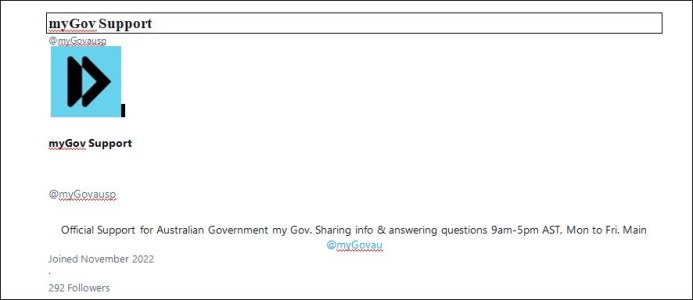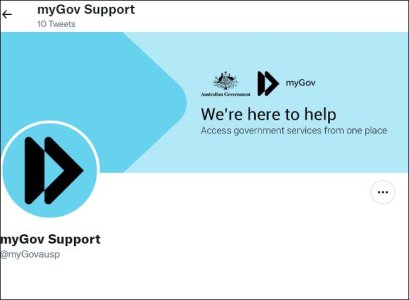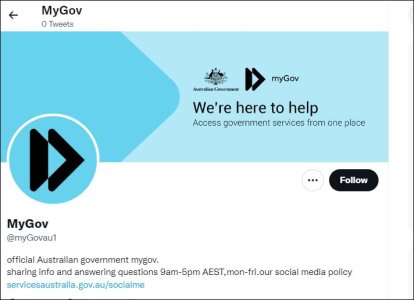Scammers are targeting major stores — Here's how one woman learned the hard way
- Replies 19
It’s a story that many can relate to: you’re browsing the internet when you see an ad that promises great deals.
While most would choose to ignore the ad, some might go out on a limb and click on it. After all, who in their right mind would turn down such a great deal?
But, as one savvy shopper recently found out, if it seems too good to be true, then it probably is.
Mother of two, Jo Murphy, was conned by fraudsters masquerading on Instagram as one of the nation’s most well-known fashion brands, Country Road.
‘It was two or three weeks before Christmas, and I saw a sponsored Country Road ad with these massive sales,’ Jo recalled.
Having her own online business, Jo thought she wouldn’t be the type to fall for the sketchy online scams that hit the headlines every now and then.
Sensing nothing amiss, she went ahead with a couple of purchases.
‘I bought a leather bag for just over $50 and a few other things,’ she said.

Jo shared that in return, she received an email receipt of the things she bought, which even sported the Country Road’s logo.
As you’ve probably guessed, Jo never received her items — and lost over $150 in the process.
It turns out, she’d been duped by a carefully crafted scam website, designed to replicate Country Road’s website design and customer experience.
Fortunately, Jo was able to recoup the money she lost, with the Commonwealth Bank refunding her money.
At the time of writing, Country Road has not commented on the matter.
However, there’s a message posted on its website warning against online scams using their brand.
‘Internet scams can illegally use the Country Road name and logo in an attempt to obtain personal information,’ it reads.
‘These schemes target people using a range of differing tactics such as fraudulent websites, fake emails, Facebook pages, text messages and/or websites offering the opportunity to win, or receive, gift cards, prizes, or false employment opportunities.’
‘Please note that the only time Country Road will ever contact you regarding a payment is when an existing order is flagged at risk or you request an exchange.’
‘At these times, you may receive an email to verify payment details or supply further identifying information. For this purpose, our Customer Service team will contact you directly from [email protected], which is the only verified email account for Country Road orders and payments.’

Country Road is not the only Australian retailer to fall victim to this type of scam, either.
Last week, another major retailer, Dotti, warned its ‘Dotti Squad’ that criminal websites were illegally using the Dotti name and logo to scam customers.
The team at My Business, a business information and customer service platform, have reported an increase in similar scams.
‘We often see fake websites offering competitive deals and Australians buy these products thinking they’re getting a bargain and buying from a reputable site,’ My Business Head of Product and Sales Phil Parisis said.
‘These cyber criminals are good at what they do — these websites are pretty convincing and often rank highly in Google.’
Consumers can keep themselves safe by not clicking on links sent by email and text message, and double-checking the domain name of websites for any misspelling.
Domain names are simply what you type in your browser’s address bar to reach a certain website. For example, Google’s domain name is ‘Google.com’.
ScamWatch also has a warning sign Aussies can watch out for in relation to online shopping scams.
‘The biggest tip-off that a retail website is a scam is the method of payment,’ they said.
‘Scammers will often ask you to pay using a money order, preloaded money card, or wire transfer, but if you send your money this way, it’s unlikely you will see it again or receive your purchased item.’
Aussies have lost $8.7 million to online shopping scams as of November 2022, with over 40 per cent of 16,209 reports posting financial losses.

With all the reports of scams floating around the internet, have you ever wondered why there’s always someone who ends up taking the bait?
There are numerous factors that contribute to shoppers falling victim to these scams, with the sheer amount of options available resulting in consumers becoming overwhelmed and thus more likely to overlook vital clues that might point to a scam.
The skill and creativity with which online criminals craft these false advertisements often gives people a false sense of security, with some people assuming they are dealing with a legitimate company.
Price is another factor that makes people more likely to purchase products from false advertisements. Often these promotions promise substantially lower prices than what would be found elsewhere in order to entice shoppers to make a purchase.
This can give the impression of getting an unbeatable deal, even though the product itself may not be genuine or may never arrive at all. Scammers also employ various forms of psychological manipulation to get shoppers to take their bait, such as offering limited amounts of products and limited-time discounts to make the deal appear exclusive and urgent.
Finally, another factor that increases the attractiveness of false advertisements is convenience. Shopping online is typically more convenient than shopping in physical stores and people have become accustomed to using online services to order their products.
Unfortunately, the more convenient nature of online shopping opens up more opportunities for shoppers to fall victim to these scams without even realising it.
With more people spending time online, it is up to both shoppers and businesses alike to be vigilant and cautious in order to protect themselves from being deceived by false advertisements.
Should you or anyone you know fall victim to a scam, report the incident as soon as possible to relevant authorities like ScamWatch and to your bank.
If you’ve given out any personal information, it would also be wise to change your access credentials such as your password to preempt any further damage that criminals might cause.
It’s important to be careful, everyone! Let Jo’s experience serve as a reminder to make sure you research any website you purchase from, and never click on any suspicious links.
So, what do you think of this story? Have you encountered similar scams?
Tell us your thoughts and experiences below!
While most would choose to ignore the ad, some might go out on a limb and click on it. After all, who in their right mind would turn down such a great deal?
But, as one savvy shopper recently found out, if it seems too good to be true, then it probably is.
Mother of two, Jo Murphy, was conned by fraudsters masquerading on Instagram as one of the nation’s most well-known fashion brands, Country Road.
‘It was two or three weeks before Christmas, and I saw a sponsored Country Road ad with these massive sales,’ Jo recalled.
Having her own online business, Jo thought she wouldn’t be the type to fall for the sketchy online scams that hit the headlines every now and then.
Sensing nothing amiss, she went ahead with a couple of purchases.
‘I bought a leather bag for just over $50 and a few other things,’ she said.

This Aussie clothing retailer is the subject of a recent online shopping scam. Image Credit: Facebook/Country Road Australia
Jo shared that in return, she received an email receipt of the things she bought, which even sported the Country Road’s logo.
As you’ve probably guessed, Jo never received her items — and lost over $150 in the process.
It turns out, she’d been duped by a carefully crafted scam website, designed to replicate Country Road’s website design and customer experience.
Fortunately, Jo was able to recoup the money she lost, with the Commonwealth Bank refunding her money.
At the time of writing, Country Road has not commented on the matter.
However, there’s a message posted on its website warning against online scams using their brand.
‘Internet scams can illegally use the Country Road name and logo in an attempt to obtain personal information,’ it reads.
‘These schemes target people using a range of differing tactics such as fraudulent websites, fake emails, Facebook pages, text messages and/or websites offering the opportunity to win, or receive, gift cards, prizes, or false employment opportunities.’
‘Please note that the only time Country Road will ever contact you regarding a payment is when an existing order is flagged at risk or you request an exchange.’
‘At these times, you may receive an email to verify payment details or supply further identifying information. For this purpose, our Customer Service team will contact you directly from [email protected], which is the only verified email account for Country Road orders and payments.’

Jo got nothing in return from her supposed Country Road shop. Stock Image Credit: Pexels/Anna Shvets
Country Road is not the only Australian retailer to fall victim to this type of scam, either.
Last week, another major retailer, Dotti, warned its ‘Dotti Squad’ that criminal websites were illegally using the Dotti name and logo to scam customers.
The team at My Business, a business information and customer service platform, have reported an increase in similar scams.
‘We often see fake websites offering competitive deals and Australians buy these products thinking they’re getting a bargain and buying from a reputable site,’ My Business Head of Product and Sales Phil Parisis said.
‘These cyber criminals are good at what they do — these websites are pretty convincing and often rank highly in Google.’
Consumers can keep themselves safe by not clicking on links sent by email and text message, and double-checking the domain name of websites for any misspelling.
Domain names are simply what you type in your browser’s address bar to reach a certain website. For example, Google’s domain name is ‘Google.com’.
ScamWatch also has a warning sign Aussies can watch out for in relation to online shopping scams.
‘The biggest tip-off that a retail website is a scam is the method of payment,’ they said.
‘Scammers will often ask you to pay using a money order, preloaded money card, or wire transfer, but if you send your money this way, it’s unlikely you will see it again or receive your purchased item.’
Aussies have lost $8.7 million to online shopping scams as of November 2022, with over 40 per cent of 16,209 reports posting financial losses.

A quarter of online shopping scams in 2022 were delivered through the internet according to ScamWatch. Stock Image Credit: Pexels/Karolina Grabowska
With all the reports of scams floating around the internet, have you ever wondered why there’s always someone who ends up taking the bait?
There are numerous factors that contribute to shoppers falling victim to these scams, with the sheer amount of options available resulting in consumers becoming overwhelmed and thus more likely to overlook vital clues that might point to a scam.
The skill and creativity with which online criminals craft these false advertisements often gives people a false sense of security, with some people assuming they are dealing with a legitimate company.
Price is another factor that makes people more likely to purchase products from false advertisements. Often these promotions promise substantially lower prices than what would be found elsewhere in order to entice shoppers to make a purchase.
This can give the impression of getting an unbeatable deal, even though the product itself may not be genuine or may never arrive at all. Scammers also employ various forms of psychological manipulation to get shoppers to take their bait, such as offering limited amounts of products and limited-time discounts to make the deal appear exclusive and urgent.
Finally, another factor that increases the attractiveness of false advertisements is convenience. Shopping online is typically more convenient than shopping in physical stores and people have become accustomed to using online services to order their products.
Unfortunately, the more convenient nature of online shopping opens up more opportunities for shoppers to fall victim to these scams without even realising it.
With more people spending time online, it is up to both shoppers and businesses alike to be vigilant and cautious in order to protect themselves from being deceived by false advertisements.
Should you or anyone you know fall victim to a scam, report the incident as soon as possible to relevant authorities like ScamWatch and to your bank.
If you’ve given out any personal information, it would also be wise to change your access credentials such as your password to preempt any further damage that criminals might cause.
It’s important to be careful, everyone! Let Jo’s experience serve as a reminder to make sure you research any website you purchase from, and never click on any suspicious links.
So, what do you think of this story? Have you encountered similar scams?
Tell us your thoughts and experiences below!











